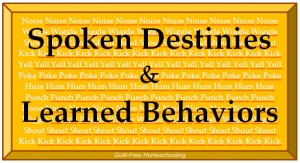“I just HAVE to keep moving and making noise! That’s what my mom says.” I heard these words with my own ears. What was more surprising to me was the realization that this 10-year-old boy had taken his mother’s observation and turned it into an assignment. Moms and Dads, be careful that your idle comments and observations do not become “spoken destinies” as this mom’s had. Children will learn to behave exactly as you say you want them to, as this boy had done. Unfortunately for this family, the words were not intended to express an expectation of the future, but just to be a summation of past experiences.
“‘Turn at the red flowers’ — that’s an ADHD-marker.” Why was it not considered simply “being aware of one’s surroundings” or “noticing a landmark” since the street sign was missing? It seems apparent that the family responsible for this remark expects ADHD-type behavior and watches for any little sign that can be attributed to it. Never mind the fact that the same boy who knows the turn is marked by red flowers also can sit calmly during an entire 2-hour movie without a wiggle, and he can focus intently on a subject of his own choosing. It seems to me that this student has incredible powers of concentration — powers that simply need to be taught how to focus on different subjects at different times.
A dear “church lady” told me the following story in order to teach me, a new mom, a thing or two about raising my children. She had been the babysitter for many children over many years and had learned much wisdom in the process. I greatly appreciated her insight and put it to use as often as possible. She had one particularly ingenious little boy in her care at the time and had caught him trying to reach the cookie jar by climbing on a kitchen chair that he had pushed over to the counter in order to facilitate his endeavor. When she had removed him from the chair and replaced the chair at the kitchen table, she told him, “Do not push that chair over there again.” A few minutes later, she realized her error as she heard an extended scraping noise and concluded that he was pushing a chair from the dining room all the way into the kitchen. The woman made sure I understood that this boy was not being disobedient — he was doing exactly according to her command. The error was, in fact, hers for not telling him all chairs, stools, and other climbable furniture were not to be used; the cookie jar was off limits.
I had a similar experience in a college computer-programming class. My program would not run corrrectly, and after much frustration I finally turned to the teacher for help. He took one quick glance at my notes and smiled, saying, “Machines are stupid. They can only do exactly what you tell them to do.” I checked back through the program and soon found my error — I had told it to do the wrong thing, and the machine was merely obeying my commands.
The point of these seemingly unrelated stories is that we need to be cautious of our words and our actions, lest they work against us. Although our children are not machines and are not “stupid,” they are to a certain extent “programmable” and can be heavily influenced by our words. We can unknowingly, unintentionally fight against our own best plans by simply tossing about a few careless phrases. Our words are like bricks: they can build up great fortresses or they can become weapons of random destruction. A few well-chosen, positive words can do wonders for our children’s behavior and attitudes. Words of confidence can instill hope in a child and the strength to try a difficult task one more time, the time that results in success.





 Guilt-Free Homeschooling is the creation of Carolyn Morrison and her daughter, Jennifer Leonhard. After serious disappointments with public school, Carolyn spent the next 11 years homeschooling her two children, from elementary to high school graduation and college admission. Refusing to force new homeschooling families to re-invent the wheel, Carolyn and Jennifer now share their encouragement, support, tips, and tricks, filling their blog with "all the answers we were looking for as a new-to-homeschooling family" and making this website a valuable resource for parents, not just a daily journal. Guilt-Free Homeschooling -- Equipping Parents for Homeschooling Success!
Guilt-Free Homeschooling is the creation of Carolyn Morrison and her daughter, Jennifer Leonhard. After serious disappointments with public school, Carolyn spent the next 11 years homeschooling her two children, from elementary to high school graduation and college admission. Refusing to force new homeschooling families to re-invent the wheel, Carolyn and Jennifer now share their encouragement, support, tips, and tricks, filling their blog with "all the answers we were looking for as a new-to-homeschooling family" and making this website a valuable resource for parents, not just a daily journal. Guilt-Free Homeschooling -- Equipping Parents for Homeschooling Success!

Recent Comments